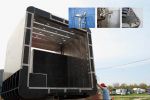Charging Ahead - The Tesla Electric Car Story
If there’s a gene for entrepreneurship, Elon Musk has it. From his first project at age 12 creating and selling a video game called Blaster for $500, to his $1-billion-plus sale of PayPal to eBay in 2002, the 37-year-old South African is every bit the born mogul. These days he’s chairman of Solar City, the largest residential solar-power provider in California. He’s also the founder and CEO of Space X, a space-exploration company that made headlines last September when it launched the first privately developed rocket into orbit. But lately it’s Musk’s newly minted role as CEO of the UK based electric-car start-up Tesla Motors that is drawing the most attention.
In October, amid global financial tumult, Tesla received a US$40-million cash infusion from private investors and announced that by 2011 it would begin selling an electric sedan powered by lithium-ion batteries with an unthinkable 385km range. The Model S won’t overtake Tesla’s 200km/h Roadster, but it will be nearly half the price, at US$60,000, and made in America. We spoke with Musk about his push to make affordable high-perfomance electric cars and why hybrids have no future.—ARNIE COOPER
Q: Can you be successful selling an alternative-fuel car now that gas prices have dipped below US$3 a gallon?
A: Absolutely. The cost difference between electric and gasoline is gigantic. When we started Tesla in 2003, gasoline was around $2.50. It takes 60 kilowatt-hours to charge the Roadster’s battery. So at California’s special rate for electric cars, currently seven cents a kilowatt-hour to charge at night, it costs roughly $5 to go 400 kilometres. And we’re zero-emissions.
Q: But gas cars are still more affordable.
A: Today. Remember, in their early days, gasoline cars were really ‘toys for the rich.’ All technology gets optimised. The typical electric motor is 90 per cent more efficient at converting energy into motion than the internal combustion engine. You get an overwhelming advantage in both carbon emissions and energy per kilometre.
Continued on next page.
Popular Tags
Cars
Regular Features

| regarding | user | just commented |
|---|---|---|
| A Smarter Electric Grid | SixWVSix | America's electricity grid |
| Energy Drinks Kill Our Buzz | nesley86 | Not only is the caffeine |
| Baking Soda: The Cure for Global Warming? | Alexis S | If we were to use it |
| NRG Typhoon Review | Karl777 | I did look at this model |
| There Is 12GB of RAM in This Asus G71gx Desktop in a Box | Karl777 | Damn this thing blasts away |
Featured
Cars
How It Works: Tomorrow's Hybrid
A plug-in concept from Volvo brings the power inside the wheels for increased efficiency and extra mileageBlasts From the Past at the New York Auto Show
At this year's NYIAS, nostalgia is king. Launch our gallery to see why








